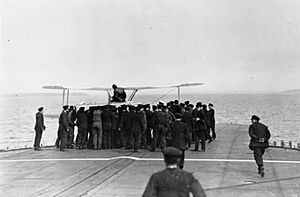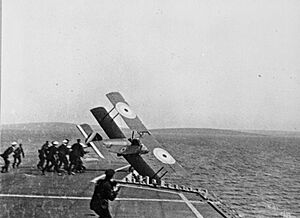Edwin Harris Dunning facts for kids
Quick facts for kids
Edwin Harris Dunning
|
|
|---|---|

Dunning is congratulated after landing on HMS Furious in his Sopwith Pup on 2 August 1917
|
|
| Born | 17 July 1892 South Africa |
| Died | August 7, 1917 (aged 25) Scapa Flow, Orkney |
| Buried |
Bradfield, Essex
|
| Allegiance | |
| Service/ |
Royal Naval Air Service |
| Years of service | at least 1916–1917 |
| Rank | Squadron Commander |
| Battles/wars | World War I |
| Awards | Distinguished Service Cross |
Edwin Harris Dunning was a brave pilot from the British Royal Naval Air Service. He was born on July 17, 1892, and sadly passed away on August 7, 1917. He made history by being the very first pilot to land an airplane on a moving ship! This was a huge step for naval aviation.
Contents
Early Life of Edwin Dunning
Edwin Dunning was born in South Africa on July 17, 1892. He was the second child of Sir Edwin Harris Dunning. Edwin went to special schools called Royal Naval Colleges. These were at Osborne and Dartmouth.
First Plane Landing on a Moving Ship
On August 2, 1917, Dunning did something amazing. He landed his Sopwith Pup airplane on a ship called HMS Furious. This happened in Scapa Flow, Orkney. The ship was moving at 26 knots, which is about 30 miles per hour. There was also a strong wind of 21 knots. This meant his plane was moving very slowly over the ship's deck.
He flew his plane to the left side of the ship. Then he carefully moved it to the right. He let it slide over the deck. Finally, he cut the engine and landed safely. This was the first time anyone had landed a plane on a moving ship!
A Tragic Accident
Just five days later, Dunning tried to land again. It was his third landing attempt that day. Sadly, an unexpected gust of wind pushed his plane. It made his plane go off the side of the ship. He was knocked out and drowned in the cockpit.
He was buried at St Lawrence's Church in Bradfield, Essex. The British Navy recognized his bravery. They said his work was a "great service" to the Navy. His landings showed that airplanes could be used with a fleet of ships. This changed naval warfare forever. The Navy also said that Dunning was very courageous. He had already landed twice successfully. But he wanted to land again before other pilots tried.
The Dunning Memorial Cup
To remember Edwin Dunning, a special award was created. It is called the Dunning Cup or Dunning Memorial Cup. This award is given every year. It goes to the officer who has done the most to help aviation for the Navy. In the 1950s and 1960s, it was given to Royal Air Force groups. These groups had to achieve high standards in anti-submarine training.
Honours and Awards for Dunning
Edwin Dunning received several awards for his brave service.
- Distinguished Service Cross: On March 14, 1916, he received the Distinguished Service Cross. This award was for his excellent work as a seaplane pilot. He made many long flights for spotting and taking pictures.
- Mentioned in Despatches: He was also mentioned in despatches twice. This means his bravery and good work were officially recognized. The first time was on March 14, 1916, for his service at Gallipoli. The second time was on October 1, 1917, after he had passed away.
Images for kids
 | Dorothy Vaughan |
 | Charles Henry Turner |
 | Hildrus Poindexter |
 | Henry Cecil McBay |





